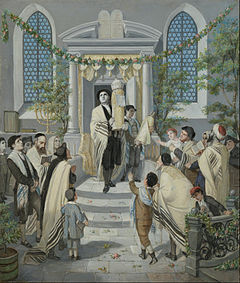Shavuot
| Shavuot | |
|---|---|

Shavuot by Moritz Daniel Oppenheim
|
|
| Official name | Hebrew: שבועות or חג השבועות (Ḥag HaShavuot or Shavuot) |
| Also called | English: "Festival of Weeks" |
| Observed by | Jews |
| Type | Jewish |
| Significance | One of the Three Pilgrimage Festivals. Celebrates the revelation of the Five Books of the Torah (or the Old Testament of the Christian Bible) by God to Moses and to the Israelites at Mount Sinai, 49 days (7 weeks) after the Exodus from Egypt. Commemorates the wheat harvesting in the Land of Israel. Culmination of the 49 days of the Counting of the Omer. |
| Celebrations | Festive meals. All-night Torah study. Recital of Akdamut liturgical poem in Ashkenazic synagogues. Reading of the Book of Ruth. Eating of dairy products. Decoration of homes and synagogues with greenery (Orach Chayim, 494). |
| Begins | the 6th day of Sivan (or the Sunday following the 6th day of Sivan in the Karaite tradition) |
| Ends | 7th (in Israel: 6th) day of Sivan |
| 2016 date | Sunset, June 11 – nightfall, June 13 |
| Related to | Passover, which precedes Shavuot |
Shavuot (![]() listen ) (or Shovuos (
listen ) (or Shovuos (![]() listen ), in Ashkenazi usage; Shavuʿoth in Sephardi and Mizrahi Hebrew (Hebrew: שבועות, lit. "Weeks"), known as the Feast of Weeks in English and as Pentecost (Πεντηκοστή) in Ancient Greek, is a Jewish holiday that occurs on the sixth day of the Hebrew month of Sivan (may fall between 14 May–15 June).
listen ), in Ashkenazi usage; Shavuʿoth in Sephardi and Mizrahi Hebrew (Hebrew: שבועות, lit. "Weeks"), known as the Feast of Weeks in English and as Pentecost (Πεντηκοστή) in Ancient Greek, is a Jewish holiday that occurs on the sixth day of the Hebrew month of Sivan (may fall between 14 May–15 June).
Shavuot has a double significance. It marks the all-important wheat harvest in the Land of Israel (Exodus 34:22); and it commemorates the anniversary of the day God gave the Torah to the entire nation of Israel assembled at Mount Sinai, although the association between the giving of the Torah (Matan Torah) and Shavuot is not explicit in the Biblical text.
...
Wikipedia
